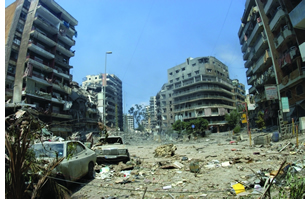How Lebanon Became a Threat to Israel
At the end of the 19th century, nationalism was on the rise in various parts of the world. As a result, many people groups began to desire their own state and international recognition. This also helped spur the Zionist movement, which encouraged Jewish people to return to Israel.
This historical process culminated in the period between the two World Wars. After World War I, the League of Nations divided the Middle East into two mandates (Article 22), which were administered by France and Great Britain. The stated aim of these mandates was to develop the region and establish new states there. Consequently, several new states emerged during this period such as Jordan (1946), Iraq (1932), Saudi Arabia (1932), Syria, and Lebanon.
Lebanon’s creation is a very special case. It first emerged as autonomous under the French mandate, based on the division of the Ottoman Provinces (called “sanjaks,” 1417–1917). Due to the natural bond between France and the Maronite Christian population (and for convenience in the creation of a modern state), Lebanon’s territory was expanded and more areas from the south and along the coast were annexed to it. This resulted in Lebanon having many minorities: Maronites, Catholics, Druze, Alawites, Sunnis, and Shiites.
In order to preserve the balance of power between these varied minorities, while maintaining the Christian population’s dominance, it was set into the Lebanese Constitution. This was enabled by the ties between France and Lebanon’s Christian population. In order to determine a balance of power, a census was conducted in 1932. No census has been conducted in Lebanon since, for fear that a change in demographics would necessitate a change in the balance of power among the various groups.
When Lebanon was established, Shiite and Sunni populations from the south of the country began to migrate toward the center. Due to this relocation and the high birth rate of these groups, pressure was created on the Christian population. They began to emigrate to Europe, and especially France. These demographic shifts affected the balance of power in Lebanon, which resulted in calls for a change in government representation for the various groups.
Lebanon wasn’t very actively involved in Israel’s War of Independence against the Arab states in 1948, due to its own internal conflicts. During the war, Palestinian refugees fled to Lebanon, again altering its demographics. The country repeatedly fell into civil wars between the various groups (1958, 1975–1990).
These civil wars encouraged outside parties to interfere in what was happening in Lebanon. France wanted to preserve its influence from the mandate period. The Russians tried to get the country to join the communist bloc, but the United States stepped in to prevent this. Syria intervened to increase its influence in the region. When the civil war spread to Israel, Israel likewise intervened, entering Lebanon and reaching the suburbs of Beirut (1982 Lebanon War).
In 1989, the Taif Accords were signed, ending the Lebanese Civil War. It was agreed that the fighting militias would be disbanded. The agreement also demanded that all foreign troops in Lebanon be withdrawn. Israel left the security zone in southern Lebanon in 2000. There was a demand for Syria to withdraw from Lebanon as well, which it did in 2005 after much pressure and a UN resolution (Resolution 1559).
Despite the call to disband the militias and respect Lebanon’s independence, Hezbollah not only refused to give up its arms, but also increased its presence in Lebanon. The influence of Islamic actors increased: Palestinian organizations gained more influence, and Hezbollah and Iran’s Shiite axis increased their armament and their integration into Lebanese politics.
Since the signing of the Taif Accords, there have been several conflicts between Israel and Lebanon (1993, 1996, 2006). But the conflict wasn’t with the Lebanese state, but with the terrorist organization Hezbollah, which is supported by Iran and doesn’t cooperate with the weak Lebanese army. Hezbollah justified its attacks on Israel by claiming that its goal is to defend Lebanon and to drive Israel out of Lebanon. By this logic, Hezbollah should have ended its role when Israel withdrew from Lebanon in 2000.
 In the summer of 2006, armed conflict broke out between Israel and Hezbollah in southern Lebanon, known in Israel as the Second Lebanon War. It was triggered by a Hezbollah raid on an Israeli military patrol on the border, in which several soldiers were abducted. Israel responded with a large-scale military operation against Hezbollah, which controlled southern Lebanon. Israel used ground troops and air strikes to destroy Hezbollah positions and infrastructure. Hezbollah responded with massive rocket fire on towns and villages in the north of Israel.
In the summer of 2006, armed conflict broke out between Israel and Hezbollah in southern Lebanon, known in Israel as the Second Lebanon War. It was triggered by a Hezbollah raid on an Israeli military patrol on the border, in which several soldiers were abducted. Israel responded with a large-scale military operation against Hezbollah, which controlled southern Lebanon. Israel used ground troops and air strikes to destroy Hezbollah positions and infrastructure. Hezbollah responded with massive rocket fire on towns and villages in the north of Israel.
In an effort to bring an end to the hostilities between Israel, Lebanon, and Hezbollah, the UN Security Council voted unanimously in favor of Resolution 1701. The resolution called for an immediate ceasefire between the parties. It also reaffirmed prior UN resolutions on the disarmament of armed militias (Resolution 1559). This clause is primarily intended for Hezbollah. It called for the evacuation of all forces not under Lebanese government control from south of the Litani River.
After the governments of Israel and Lebanon agreed to the UN resolution, a ceasefire between Israel, Lebanon, and Hezbollah was reached at 8:00 am on August 14, 2006. All parties largely complied with the main provisions. Israel withdrew its troops and kept a low profile. The UN and the Lebanese army took control of southern Lebanon along the border. And the number of soldiers from the United Nations Peacekeeping Force in Lebanon (UNIFIL) increased from 2,000 to 15,000.
Although the Lebanese government agreed to the resolution, Hezbollah has not dismantled its weapons. The Secretary General of the UN said that UNIFIL’s mandate isn’t to disarm Hezbollah. Hezbollah claimed that it had withdrawn its armed forces from the south of Lebanon, but insisted that its people were part of southern Lebanon and would remain there. Over the years, Hezbollah’s armed forces have advanced southward and positioned themselves along the border. They have set up observation posts and rocket launching sites in clear violation of the UN Security Council resolution, which was endorsed by the governments of both Lebanon and Israel.
Documents seized by the Israeli army in Kahn Yunis in the Gaza Strip, show that Hezbollah had pledged to attack Israel along with Hamas on October 7th. Hamas expected Hezbollah to keep its promise, but Hezbollah’s attacks on Israel were very limited. It didn’t attack with its rocket arsenal, as it did in the 2006 Lebanon War. However, the attacks on Israeli border towns and military positions prompted Israel to clear the towns of civilians.
In response to Hezbollah’s attacks, Israel is attacking Hezbollah targets in the south of Lebanon. Hezbollah has lost around 250 people in its attacks on Israel thus far, and has not gained any advantage or benefit for Lebanese citizens. Rather, through the response of the Israeli army, residents have been injured and villages located near Hezbollah positions have been damaged, while Lebanon’s weak economic situation has worsened.
At the beginning of its history, Lebanon was a prosperous place for all its citizens. Despite conflicts and wars, Lebanon managed to develop in a positive direction. Beirut was affectionately called the “Paris of the Middle East.” But with the rise of Hezbollah and Islamic influence in the country, circumstances worsened for the Christian population. They suffer because Hezbollah doesn’t make Lebanon its top priority, but the desires of its patron, Iran. In their eyes, Lebanon is just a springboard for an attack on Israel.
But the Christian population is trying to fight back against Hezbollah. Samir Geagea, one of the Christian leaders in Lebanon, warned that Hezbollah doesn’t represent the country, and its actions do not contribute to its reconstruction. He also called for Hezbollah to withdraw from southern Lebanon.
The situation that Lebanon and its Christians are facing isn’t an isolated case. The same factors can be seen in several places in Israel, such as Bethlehem and Nazareth. They began as thriving, developing regions, with good schools and Western infrastructure. Then these areas attract other populations, who are welcomed. But as Islam grows in influence, the situation worsens. The Christian population slowly leaves, because Muslim pressure is increasing and their freedoms are being taken away.
God calls us to be a light in the world (Matt 5:14). The core values of the Western world, which brought progress and advancement, were based in God’s Word. Many of those who set out to explore the world had the goal of bringing the gospel to the ends of the earth (Matt 28:18-20). Satan fights against the faithful and twists God’s Word. He tries to convince us that God’s love requires us to tolerate everyone and everything. God loves all people, and His very nature is love (John 3:16; 1 John 4:8). We are all sinners (Rom 3:23) who need Jesus. But He hates sin and all false teaching (Heb 1:9; Rev 2:6), so we must not tolerate it either. We must stand up for our values and not compromise. We must not conform to the world in the name of love, and watch as it disregards the values God’s Word commands us to preserve.
Israel’s war against Hamas and Hezbollah in Lebanon, as well as the present situation in Lebanon under Hezbollah’s influence, are a warning to us. Let’s hold onto our values. Let’s protect our children’s future. And let’s cultivate faith in the Messiah Yeshua. We must not be tolerant of sin, but we must love the sinner.
News From Israel - 11/2024


